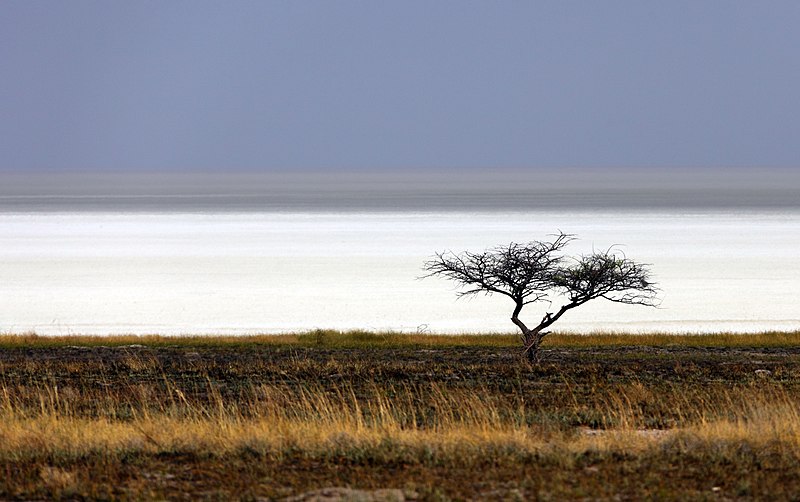Lahabali kɔligu:Dry Etosha Pan.jpg

Jɔhiyuli maa galisim:800 × 502 anfooni bihi bihi. Din pahi resolutions: 320 × 201 anfooni bihi bihi | 640 × 402 anfooni bihi bihi | 1,024 × 643 anfooni bihi bihi | 1,280 × 804 anfooni bihi bihi | 2,560 × 1,607 anfooni bihi bihi | 3,835 × 2,408 anfooni bihi bihi.
Faal maa maŋmaŋa (3,835 × 2,408 pixels, file size: 3.76 MB, MIME type: image/jpeg)
Faal tarihi
Dihimi dabisili/saha n-nya kɔl' bihi kamani di ni di yina shɛm
| Zuŋɔ dabisili/Saha | Thumbnail | Di tarisi | ŋun su | tɔhibu | |
|---|---|---|---|---|---|
| din na chana | 02:14, 14 Silimin gɔli January 2012 |  | 3,835 × 2,408 (3.76 MB) | Alchemist-hp | some small corrections |
| 23:49, 10 Silimin gɔli January 2012 |  | 3,835 × 2,408 (3.34 MB) | Alchemist-hp | == {{int:filedesc}} == {{Information |Description= {{de|1=Ein Blick über die verdorrte Savanne auf die trockene, heiße und salzverkrustete Etosha-Pfanne in Namibia.}} {{en|1=A sign of the dry, hot and salt-encrusted |
Lahibali kɔligu zaŋ tum tuma
Din doli ŋɔ na yaɣili tuma nima zaŋ ti lahabali kɔligu ŋɔ:
Duniya zaa lahabali kɔligu zaŋ tum tuma
Wikis shɛŋa ŋan dolina ŋɔ gba malila faal ŋɔ n kuri bukaata:
- Zaŋ tum tuma af.wikipedia.org zuɣuc
- Zaŋ tum tuma az.wikipedia.org zuɣuc
- Zaŋ tum tuma be-tarask.wikipedia.org zuɣuc
- Zaŋ tum tuma be.wikipedia.org zuɣuc
- Zaŋ tum tuma bn.wikipedia.org zuɣuc
- Zaŋ tum tuma ceb.wikipedia.org zuɣuc
- Zaŋ tum tuma crh.wikipedia.org zuɣuc
- Zaŋ tum tuma cv.wikipedia.org zuɣuc
- Zaŋ tum tuma de.wikipedia.org zuɣuc
- Etosha-Pfanne
- Portal Diskussion:Geographie/Bild des Monats
- Wikipedia:Exzellente Bilder/Landschaften
- Drittel-Regel
- Portal:Geographie/Bild des Monats/11
- Wikipedia:Kandidaten für exzellente Bilder/Archiv2012/1
- Wikipedia:Diskussionen über Bilder/Archiv/2012/Jan
- Datei:Dry Etosha Pan.jpg
- Portal:Afrika/Unsere besten Bilder
- Welterbe in Namibia
- Zaŋ tum tuma en.wikipedia.org zuɣuc
- Zaŋ tum tuma eo.wikipedia.org zuɣuc
- Zaŋ tum tuma es.wikipedia.org zuɣuc
- Zaŋ tum tuma fr.wikipedia.org zuɣuc
- Zaŋ tum tuma hu.wikipedia.org zuɣuc
- Zaŋ tum tuma hy.wikipedia.org zuɣuc
- Zaŋ tum tuma id.wikipedia.org zuɣuc
- Wikipedia:Gambar pilihan/Usulan/2022
- Wikipedia:Gambar pilihan/Usulan/2022/Periode 13
- Wikipedia:Gambar pilihan/2022
- Wikipedia:Gambar pilihan/50 2022
- Wikipedia:Arsip halaman utama/2022/07/16
- Wikipedia:Arsip halaman utama/2022/07/17
- Wikipedia:Arsip halaman utama/2022/07/18
- Wikipedia:Arsip halaman utama/2022/07/19
- Zaŋ tum tuma it.wikipedia.org zuɣuc
- Zaŋ tum tuma it.wikivoyage.org zuɣuc
- Zaŋ tum tuma ja.wikipedia.org zuɣuc
- Zaŋ tum tuma ka.wikipedia.org zuɣuc
- Zaŋ tum tuma ko.wikipedia.org zuɣuc
Yulima more global usage zaŋ chaŋ lahabali kɔligu ŋɔ.



